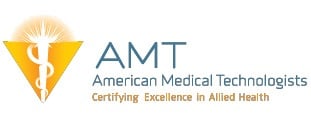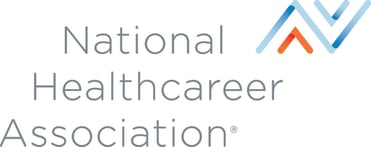Health Science | NHA CCMA | Medical Assisting
AMT RMA vs. NHA CCMA: What’s the Difference?
Medical assisting is one of the most in-demand healthcare professions in the country.
But before students can start their careers, they have to earn their certifications!
Two of the most popular choices are the AMT RMA certification and the NHA CCMA certification.
Both of them vouch that a student is ready to start his or her career as a medical assistant.
But how do you decide which is right for your students?
In this post, you’ll learn about four key differences between AMT RMA and NHA CCMA to help you choose:
- The differences between certification providers
- Eligibility requirements
- The cost of the exam
- The structure of the exam
- The study materials available
To start, let’s look at the differences between AMT and NHA!
1. What Are AMT and NHA?
The AMT and NHA are similar healthcare certification providers, but they have a few differences.
Some teachers like the long-time track record of NHA, while others like the specific certifications available from AMT.
But there’s more to these organizations than that!
First, we’ll look at AMT.
What Is AMT?

American Medical Technologists (AMT) is a nationally-accredited provider of allied health certifications.
Since 1939, AMT has been focused on “supporting allied health professionals in their quest to verify their skills and competence; learn and grow in in their chosen profession; and maintain quality in the workplace.”
To accomplish this, AMT provides certifications for 11 allied health professions:
- Medical Assistant (RMA)
- Medical Laboratory Scientist (MLS)
- Phlebotomy Technician (RPT)
- Medical Laboratory Technician (MLT)
- Molecular Diagnostics Technologist (MDT)
- Medical Laboratory Assistant (CMLA)
- Medical Administrative Specialist (CMAS)
- Patient Care Technician (PCT)
- Dental Assistant (RDA)
- Allied Health Instructor (AHI)
- Certified Laboratory Consultant (CLC)
Overall, AMT helps current medical professionals hone and grow their skills – especially in lab-related occupations.
What Is NHA?

The National Healthcareer Association (NHA) is another industry-recognized health science certification provider.
The NHA’s mission is to “empower people to access a better future” by improving the quality of patient care and providing better opportunities for people to become healthcare professionals.
To help meet those goals, the NHA provides eight health science certifications:
- Billing and Coding Specialist (CBCS)
- Clinical Medical Assistant (CCMA)
- Electronic Health Record Specialist (CEHRS)
- EKG Technician (CET)
- Medical Administrative Assistant (CMAA)
- Patient Care Technician/Assistant (CPCT/A)
- Pharmacy Technician (CPhT)
- Phlebotomy Technician (CPT)
The NHA is an excellent provider of certifications to help people just getting started in the healthcare industry, especially CTE students!
Now that you have some background on each certification provider, let’s get into the details of the exams!
We’ll start with one of the most important questions you can ask about a health science certification: what are the eligibility requirements?
2. What Are the Certification Eligibility Requirements?
Depending on the age of your students and your state, your eligibility requirements can vary for each certification.
That’s why it’s so important to know eligibility requirements for each certification provider!
What Are the Eligibility Requirements for the AMT RMA Exam?
In order to apply for the AMT RMA exam, a candidate must have completed one of the following:
- Graduated from an accredited medical assistant program in the past four years with a minimum of 720 program hours (including at least 160 hours of clinical externship work)
- Graduated from a formal medical assistant training program of the US Armed Forces in the past four years
- Worked as a medical assistant for at least five of the past seven years and be CPR certified
- Instructed a medical assistant program for at least five years and completed a course of instruction in a discipline related to medical assisting
To help candidates determine if they are eligible for the RMA exam, the AMT provides a self-assessment checklist and an eligibility chart.
Currently, high school students are not able to take the AMT RMA exam until after they have graduated and turned age 18.
That means if you teach CTE health science courses, your students won’t be able to take an AMT exam until after they have fully completed your course and graduated from the school.
Some high school programs do use the AMT RMA exam as an end-of-program assessment, but it can be tough to help them prep for exam day, since they’re no longer students!
Because of this, the AMT RMA exam works best for individuals who are already working in an entry level position in the healthcare industry.
What Are the Eligibility Requirements for the NHA CCMA Exam?
To apply for the NHA CCMA exam, a candidate must meet two requirements set by the NHA.
First, the candidate must have a high school diploma or GED equivalent.
In addition, they must have completed a medical assistant training program or:
- CCMA training from an accredited or state-recognized provider
- Registered Apprenticeship Program in medical assisting, registered with the US Department of Labor
- Formal medical training in medical assisting offered by a branch of the US military
The NHA also awards provisional CCMA certifications to high school health science students who pass the exam within 12 months of graduating from a high school or GED program.
Provisional certifications are different because:
- They expire 12 months after the exam date
- They require students to apply to have the provisional certification converted into a full certification
For more detail on both standard and provisional certifications, check out the NHA’s Candidate Handbook.
Overall, the flexibility of the NHA CCMA exam makes it a great choice for CTE medical assistant programs to give high school students a leg-up before entering the healthcare industry.
3. How Much Do the Exams Cost?
When it comes to any resource for your classroom, you need to know how much it costs.
So, how much can you and your students expect to spend on each of these exams?
How Much Is the AMT RMA Exam?
To apply for the AMT RMA exam, a candidate must pay a $135 non-refundable fee.
After someone is certified as a registered medical assistant, they must renew it on a yearly basis to maintain their certification status.
To do this, members must pay an annual fee of $75 and complete continuing education activities through the AMT’s Certification Continuation Program (CCP).
How Much is the NHA CCMA Exam?
The NHA charges a $160 application fee, which is paid at the time of registration.
In some cases, this fee may be covered by an institution or employer. It depends on each candidate’s individual situation.
Once certified, professionals must renew their NHA certification every two years.
Certified individuals must complete 10 continuing education credits provided by the NHA and pay the $179 renewal fee.
Now that we’ve reviewed the cost of each certification, let’s dig into the details of the exams themselves!
4. How Are the Exams Structured?
Because AMT and NHA are so different as organizations, their certification exams are different as well.
Namely, you can compare and contrast three areas of the exams:
- The topics
- The number of questions
- The amount of time allotted for the test
Let’s dive into the AMT RMA exam!
How Is the AMT RMA Exam Structured?
The AMT RMA exam is segmented into four work areas:
- Anatomy and Physiology
- Administrative Medical Assisting
- Clinical Medical Assisting
- Clinical Patient Interaction
Each work area is made up of categories that contain specific topics and skills a student needs to know for success on the RMA exam.
Combined, these work areas account for 210 questions.
Anatomy and Physiology
The Anatomy and Physiology work area includes two categories related to the foundational knowledge every medical assistant must know:
- Body Systems
- Medical Terminology
Administrative Medical Assisting
The Administrative Medical Assisting work area has five categories that focus on the administrative duties medical assistants may perform:
- Insurance
- Financial Bookkeeping
- Medical Receptionist / Secretarial / Clerical
- Medical Law and Ethics
- Human Relations
Clinical Medical Assisting
The Clinical Medical Assisting work area includes five categories related to maintaining a safe environment for patients and other workers:
- Asepsis
- Sterilization
- Instruments
- Laboratory Procedures
- Minor Surgery
Clinical Patient Interaction
The Clinical Patient Interaction work area has eight categories about skills that medical assistants need to work with patients:
- Patient Education
- Vital Signs and Measurement
- Physical Examinations
- Clinical Pharmacology
- Therapeutic Modalities
- Laboratory Procedures
- Electrocardiography
- First Aid, CPR, and Emergency Response
Overall, the AMT RMA exam provides a well-rounded opportunity for students to work as a medical assistant in either an administrative or clinical setting.
On test day, students have two hours to complete the exam at a designated testing site via an online portal.
How Is the NHA CCMA Exam Structured?
The NHA CCMA exam has 150 scored questions and 30 pretest questions that the NHA uses to gather data.
These questions fall into seven topic areas called “domains:”
- Foundational Knowledge and Basic Science
- Anatomy and Physiology
- Clinical Patient Care
- Patient Care Coordination and Education
- Administrative Assisting
- Communication and Customer Service
- Medical Law and Ethics
Each domain is broken down into knowledge and skill statements that test students on the essentials they need to know.
Note: The first three domains contain the widest variety of statements, so they are organized into subtopics (shown in bulleted lists). The latter four domains are not organized into multiple subtopics, so don’t include bulleted lists.
Foundational Knowledge and Basic Science
The Foundational Knowledge and Basic Science domain includes five subtopics related to basic knowledge for medical assistants:
- Health care systems and settings
- Medical terminology
- Basic pharmacology
- Nutrition
- Psychology
Anatomy and Physiology
The Anatomy and Physiology domain has three subtopics about the human body:
- Body structures and organ systems
- Pathophysiology and disease processes
- Microbiology
Clinical Patient Care
The Clinical Patient Care domain features five subtopics focused on working with patients:
- General patient care
- Infection control
- Testing and laboratory procedures
- Phlebotomy
- EKG and cardiovascular testing
Patient Care Coordination and Education
The Patient Care Coordination and Education domain doesn’t have specific subtopics. Instead, it tests students on how a medical assistant interacts with patients and their families.
Administrative Assistant
The Administrative Assistant domain covers patient scheduling, medical records, and other administrative duties.
Communication and Customer Service
The Communication and Customer Service domain discusses how medical assistants communicate with patients and other healthcare workers.
Medical Law and Ethics
The Medical Law and Ethics domain focuses on protocols to follow in healthcare facilities. These includes topics like advanced directives, patient privacy, and more.
Ultimately, the NHA CCMA exam is very focused on the concepts and skills needed for a career as a clinical medical assistant and doesn’t include as many administrative skills.
On test day, students have three hours to complete the exam either via an online portal or on paper.
So now that you know what to expect from each certification exam, it’s time to discuss the test prep materials available!
5. What Test Prep Materials Are Available to Students?
If you need to prep students for a medical assisting certification, it’s important to know the materials available!
Test Prep Materials for the AMT RMA Exam
AMT has developed an online review course for the RMA exam, which you can purchase as a full package or by segment:
- Full medical assistant review course plus two practice exams ($230)
- Review course module on anatomy and physiology ($65)
- Review course module on administrative skills ($35)
- Review course module on clinical skills ($25)
- Review course module on clinical patient interaction ($65)
- Review course module on pharmacology ($35)
This flexibility lets candidates buy materials based on where they need the most prep work. That also makes the exam much more affordable for candidates worried about costs!
Test Prep Materials for the NHA CCMA Exam
The NHA provides five test prep options for the NHA CCMA exam, which are all sold a la carte:
- Online practice test ($44)
- Online study guide ($62)
- Online study guide & practice test package ($83)
- Printed study guide ($62)
- Printed study guide & online practice test package ($83)
These resources help students master every detail of the NHA CCMA exam.
In addition, some schools help cover the cost of these materials which can reduce the amount of money students need to spend on getting ready for their certifications!
Is the AMT RMA or NHA CCMA Exam Right for Your Students?
So which medical assistant certification should you implement as part of your program?
Both certifications are industry-backed options to set students on a successful career path.
However, the eligibility requirements and skills covered are vastly different.
On top of that, one certification may hold more weight depending on the preferences of your local healthcare providers.
That’s why it’s crucial to choose the certification that best aligns with the needs of you, your students, and your community.
So, which one should you choose?
Summary: AMT RMA
The AMT RMA is especially useful in areas where the demand for well-rounded medical assistants are in high-demand.
However, if you’re a high school health science instructor the AMT RMA exam could cause some logistical issues.
That makes the AMT RMA exam a good fit for post-secondary medical assistant programs.
If you’re interested in learning more about the AMT RMA exam, visit the AMT website.
Summary: NHA CCMA
With a more specialized focus on clinical skills, the NHA CCMA exam is a good choice for communities in need of clinical medical assistants.
In addition, it’s flexibility for applicants means the NHA CCMA exam is a great option for both post-secondary and high school CTE medical programs.
If you’re interested in learning more about the NHA CCMA exam, visit the NHA CCMA certification info center!

